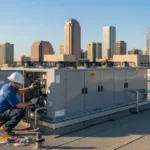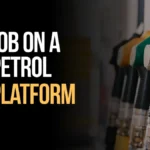Working on a petrol platform, also called an oil rig, can feel intimidating if you’ve never done it before. I get it—these platforms look huge, with lots of machinery and people moving around fast.
But the truth is, many oil platform workers start with zero experience. Companies in the USA often hire beginners for entry-level roles, provide training, meals, housing, and sometimes even cover safety certifications.
If you want to start, this guide will walk you through real entry-level jobs on petrol platforms, daily life offshore, pay, safety, and how to grow your career in oil rig jobs.
Why Consider Jobs on Petrol Platforms
Jobs on petrol platforms are a solid choice for people starting out. Even entry-level offshore oil rig jobs pay well—often between $40,000 and $60,000 a year. Housing and food are provided, so you can save most of your earnings.
Another reason people take these positions is career growth. You start in an entry-level role, learn the ropes, and can move up to floorhand, maintenance worker, or supervisor. Some eventually run entire crews.
And yes, there’s a sense of adventure. Many offshore rig jobs are in the Gulf of Mexico, Alaska, or other offshore areas. Life on an oil platform is different, but many workers enjoy the routine once they adjust.
Entry-Level Job Opportunities on Oil Rigs
You don’t need a degree to start. Here are some of the most common entry-level jobs on petrol platforms and offshore rig jobs:
- Roustabout – This is general labor. You move equipment, clean, paint, and help the crew wherever needed. Almost everyone starts here.
- Galley Hand / Steward – You work in the kitchen, serve meals, and clean cabins. It’s essential for keeping the platform running smoothly.
- Floorhand – Assist the drill team. Carry tools, help with equipment, and learn how things work. The pay is good once you get the hang of it.
- Maintenance Helper – Support mechanics, electricians, and welders. Carry tools, clean work areas, and pick up skills on the job.
- Painter / Cleaner – Keeps the platform safe and maintained. Simple but very important work.
Many oil platform workers start in one of these roles. You’ll pick up skills fast, and promotions come with experience.
Skills That Matter for Oil Platform Workers
Employers aren’t looking for degrees—they want practical skills and a good attitude. Here’s what helps:
- Physical fitness – You’ll lift, bend, climb, and move for long periods.
- Safety awareness – Following rules keeps you and others safe.
- Teamwork – Everyone relies on each other on offshore rigs.
- Endurance – Shifts are long, usually 12 hours.
- Basic tool skills – Handy, but not required. You learn as you go.
Showing up on time, being reliable, and being willing to learn matter more than anything else.
Certifications That Help You Get Hired
You can get jobs on petrol platforms without certifications, but a few make you stand out:
- TWIC Card – Required for US port access.
- BOSIET – Safety, firefighting, and helicopter survival training.
- H2S Safety – Awareness for hydrogen sulfide gas.
- CPR / First Aid – Useful in emergencies.
Some companies cover certification costs once you’re hired. Having them in advance just gives you an advantage.
How to Get Hired for Oil Platform Jobs
- Find the jobs – Most offshore rig jobs in the USA are in Texas, Louisiana, and Alaska. Companies like Transocean, Noble, Schlumberger, Halliburton, and Diamond Offshore hire regularly.
- Prepare a resume – Focus on physical work, teamwork, and safety experience. Warehouse, farm, or construction work counts.
- Apply – Job boards like Rigzone, OilandGasJobSearch, Indeed, and company websites post offshore oil rig jobs often. Don’t wait for the “perfect” role.
- Get certifications – Start with a TWIC card. BOSIET and H2S training improve your chances.
- Network – Connect with oil and gas recruiters on LinkedIn. Job fairs in Texas and Louisiana are also useful.
- Be open to contracts – Many beginners start on short-term contracts. Do a good job, and it often turns into a permanent position.
Life on an Oil Platform
Life on an oil platform is structured but demanding. Shifts are usually 12 hours, then 12 hours off. Rotations are typically 2–3 weeks offshore, followed by 2–3 weeks at home.
Facilities include shared cabins, meals, a small gym, and sometimes limited Wi-Fi. Daily work involves cleaning, maintenance, drills, and assisting other team members.
Challenges include being away from family, long days, and rough weather. Most oil platform workers adapt quickly and appreciate the steady schedule and pay.
Salary Guide for Entry-Level Offshore Rig Jobs
- Roustabout: $40,000 – $60,000
- Galley Hand: $35,000 – $50,000
- Floorhand: $45,000 – $70,000
- Maintenance Helper: $70,000 – $100,000
Since housing and food are included, you can save a large part of your earnings. Offshore work can be financially rewarding if you stick with it.
Safety Tips for Oil Platform Workers
- Always wear protective gear.
- Take drills seriously.
- Report hazards immediately.
- Pace yourself to avoid fatigue.
Safety is the most important part of any oil platform job.
FAQs About Oil Platform Careers
Can I work offshore with no experience?
Yes. Entry-level roles like roustabout or steward are made for beginners.
Do I need a degree?
No. Skills and certifications matter more than formal education.
Where are most jobs in the USA?
Texas, Louisiana (Gulf of Mexico), and Alaska.
How long are shifts?
Usually 12 hours per day.
Is it dangerous?
Risks exist, but following safety rules reduces them greatly.
How do I get hired quickly?
Get a TWIC card, apply for entry-level oil platform jobs, and consider short contracts.
Tips for Starting Your Oil Rig Career
- Start small. Every offshore worker once worked as a roustabout or galley hand.
- Get one or two basic certifications early.
- Apply to multiple oil platform jobs. Don’t wait for the “perfect” opportunity.
- Stay physically and mentally ready for offshore life.
- Ask questions. Watch experienced workers. Learn by doing.
Conclusion
You don’t need prior experience to start a career on a petrol platform. Begin with entry-level oil rig jobs, secure the necessary certificates, and be ready for offshore life. Jobs on petrol platforms offer good pay, experience, and growth. With effort and patience, you can build a long-term career in oil rig careers or offshore rig jobs.
You might also like to read
Top 15 Fun Things to Do With Kids Near Me This Weekend
Client Relationship Partner Guide: 15 Effective Tips to Build Trust and Loyalty










